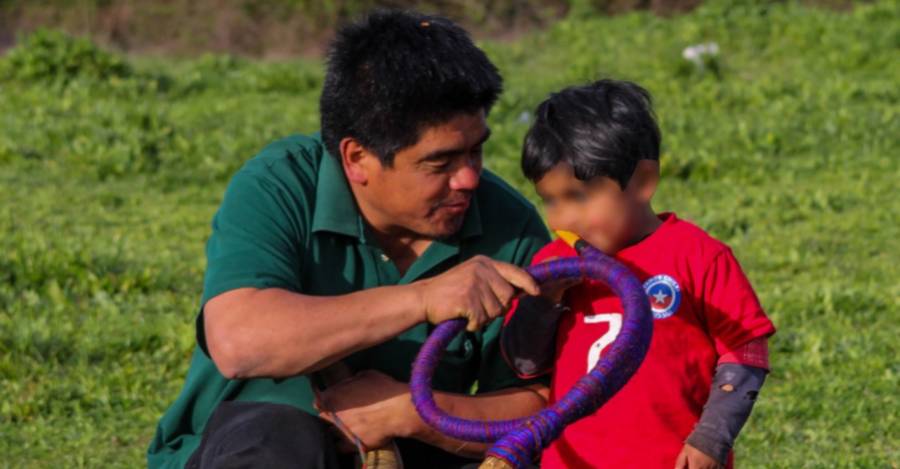Dying for Change, an Indigenous Mapuche Dilemma
By Dame Nina Saleh Ahmed – June 28th 2020.

Today Chile’s indigenous Mapuche political prisoners, incarcerated as a result of the defence of their ancestral territory enter day 57 of a hunger strike. This in demand for their removal from prison due to their increased risk to Covid 19.
Whilst the death of Mapuche Werken (traditional ancestral community leader) Alejandro Treuquil represents the very latest in an unending series of murders of innocent unarmed Mapuche land rights proponents spanning two decades of post dictatorship governance. There have been 20 such murders since 2001, many of whom have been killed at the hands of Chilean state police, many shot in the back as they fled state sponsored assailants.
In line with this mode of execution, Alejandro Treuquil died from a gunshot wound to the back of the neck on Thurs 4th June after being ambushed, along with four other Mapuche who each suffered injuries, just days after receiving death threats from military Police (Carabineros) in We Newén community near Collipuli, Southern Chile. Werken Treuquil a devoted family man leaves behind a wife and three children, his funeral took place on Sunday 7th June.
As spokesperson for the We Newén community, Werken Treuquil had led them in recovering their ancestral land from Frontel Electricity Company, having occupied the area for the past 7 years. Immediately prior to his death, observers from the Chilean National Institute of Human Rights (INDH) announced a visit to the community to investigate the police oppression reported by the community.
In a public statement released by the community following the death of Treuquil they describe living under a state of siege by military police. “We have been victims of illegitimate police persecution, for which a preventive appeal for protection was filed, revealing the constant and repeated threats suffered by the people of the community and especially by our werkén, who died today, “our werkén was cowardly murdered by individuals from outside the community while he was searching for one of his horses nearby.” Such are the consequences of a repressive and militarised policy in the region coupled with a general culture of disinformation and prejudices of Chilean society towards this indigenous people.
In an interview just weeks prior to his murder Treuquil spoke of psychological warfare by the occupying police force and the racism expressed by them. “The police shout insults at us every day through the speakers of their vehicles, such as “f*****g Indians you are going to fall one by one” and “we are going to kill you, sons of bitches.”
The death toll of Mapuche men in a post-Pinochet democracy, at the hands of Chilean police officers reflects the institutionalised racism inherent in the Chilean state and its security forces used to suppress their legitimate land rights claims. Mirroring the institutional racism of the USA in which we recently witnessed the cold blooded and calculated murder of George Floyd, an innocent unarmed African American man at the hands of US police officers.
There are currently Mapuche political prisoners incarcerated in Chilean prisons, convicted under the anachronistic Pinochet era anti-terrorist law 19.027 first enacted in 1984 and today used exclusively against the Mapuche to repress legitimate land rights protests. The law treats land occupations and direct action as acts of terrorism and subjects those charged to both civilian and military trials. Moreover it sanctions the use of “anonymous” or unidentified prosecution witnesses, allowing for indefinite detention for people labelled as “terrorists.”
According to the World Health Organisation Indigenous peoples such as the Navaho for example are up to 10 times more likely to contract Covid 19 than their non-indigenous counterparts due in part to the poor socio-economic conditions in which they live, the discrimination which they face when accessing mainstream healthcare, the difficulty in doing so for remote indigenous communities and fundamentally due to their low immunity to 1st world disease. For these reasons WHO outlines special procedures for the protection of the highly vulnerable indigenous communities during the pandemic.
For Mapuche political prisoners, incarceration renders them exceptionally vulnerable to the contraction of the virus often in unsanitary prison conditions with poor access to hand washing facilities. Under ordinary circumstances ILO Convention 169, to which Chile is a signatory, sets out that “In imposing penalties laid down by general law on members of these peoples account shall be taken of their economic, social and cultural characteristics. “And that “Preference shall be given to methods of punishment other than confinement in prison.”
In light of WHO, ILO Convention 169 and other relevant international instruments advice, the incarceration in prison facilities of Mapuche political prisoners is highly unethical and exceptionally endangers life during the pandemic. It could also be said to be a further instrument of torture as a new means by which to inflict both psychological and physical injury against the Mapuche people and to radically demoralise them as an additional strategy of repression used to deny their inherent and just claims to their traditional ancestral territory.
List of Murdered Mapuche people
Agustina Huenupe Pavian (2001);Mauricio Huenope Pavian (2001) Jorge Antonio Suarez Marihuan (2001) Edmundo Alex Lemunao Saavedra (2002) Julio Alberto Huentecura Llancaleo (2004) Zenen Alfonso Diaz Necul (2005) Jose Gerardo Huenante Huenante (2005) Lonko Juan Lorenzo Collihuin Catril (2006) Matius Valentin Catrileo Quezada (2008) Johnny Cariqueo Yanez (2008) Jaime Facundo Mendoza Collio (2009) Rodrigo Melinao Lican (2013) Jose Mauricio Quintriqueo Huaiquimil (2014) Victor Manuel Mendoza Collio (2014) Macarena Valdes (2016) Luis Marileo (2017) Patricio Gonzalez (2017) Camilo Marcelo Catrillanca Marín (2018) Lemuel Fernandez (2019) Alejandro Alberto Treuquil Treuquil (2020)
Bibliography
World Health Organisation
https://www.who.int/news-room/q-a-detail/q-a-coronaviruses
United Nations Economic and Social Council – The Impact of COVID-19 on Indigenous Peoples
https://www.un.org/development/desa/dpad/wp-content/uploads/sites/45/publication/PB_70.pdf
C169 – Indigenous and Tribal Peoples Convention, 1989
https://www.ilo.org/dyn/normlex/en/f?p=NORMLEXPUB:12100:0::NO::P12100_ILO_CODE:C169
Women Mobilising Memory by Ayse Gol Atinay
